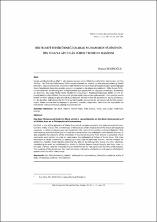| dc.contributor.author | Bekiroğlu, Harun | |
| dc.date.accessioned | 2019-05-16T21:07:38Z | |
| dc.date.available | 2019-05-16T21:07:38Z | |
| dc.date.issued | 2013 | |
| dc.identifier.citation | Bekiroğlu, H. (2013). Bir felsefî tefsir örneği olarak Muhammed Hâdimî’nin İbn Sina’ya ait İhlas Suresi tefsirine haşiyesi. Hitit Üniversitesi İlahiyat Fakültesi Dergisi, 12(23), 127-154. | en_US |
| dc.identifier.issn | 2651-3978 | |
| dc.identifier.uri | https://hdl.handle.net/11491/3010 | |
| dc.description | research | en_US |
| dc.description.abstract | Varlık, varlığın birliği ve Allah’ın zâtı konularına yer verilen İhlâs Suresi’ni tefsir edenlerden biri İbn Sînâ’dır. İbn Sînâ’nın İhlâs Suresi Tefsiri nasların felsefe ve mantık kurallarıyla yorumlandığı felsefî tefsirlerin başlıcalarındandır. Felsefe ve aklî ilimlerle Kur’an’ın nasıl anlaşılabileceğini gösterdiği gibi İslam felsefesinin teoriden pratiğe geçişinin sonuçlarını da ortaya koymaktadır. İhlâs Suresi Tefsiri’nde kullanılan felsefî kurgunun anlaşılabilmesi için çeşitli şerh ve haşiyeler yazılmıştır. Bunlardan en önemlisi, Ebu Said Muhammed Hâdimî’nin haşiyesidir. Risalesini bütüncül, delilli ve ilmî bir tarzda kaleme alan Hâdimî, her hangi bir görüşü ispat etme amacı gütmemiştir. Aynı şekilde eserin felsefî bir tefsir olduğunu göz önünde bulundurarak felsefe ve mantık kurallarının dışına çıkmamıştır. Bu kurallar doğrultusunda İbn Sînâ’ya katılmadığı görüşlerini de gerekçeleriyle birlikte açıklamıştır. Halen yazma olan bu haşiyenin, yöntemi, konuları, eleştirileri, farklılıkları ve kaynakları bu makalenin ortaya koymaya çalıştığı hususlardandır. | en_US |
| dc.description.abstract | Ibn Sinâ is one of the glossator of Ikhlas Sura which contains creature, the unity/oneness of creature and entity of God. The commentary of Ikhlas Sura of Ibn Sina is one of the major philosophical exegeses in which evidences are commented by the rules of philosophy and logic/dialectic. This commentary puts forth how Qur’an could be understood by the philosophic and rational sciences. It also presents the outcome of the transition of Islamic philosophy from theory to practical. Many comments were written in order to understand the philosophical fiction of Ikhlas Sura. The most important of those comments is belonging to Ebu Said Muhammed Hadimi. Hadimi created his epistle in a holistic, evidential and scholarly way and he did not aspire to prove any view. Likewise, considering his work as a philosophical study, he did not digress the philosophy and logic rules. In the light of these rules he explained his opinions that he did not agree with Ibn Sina with reasons. The subjects of this article are the method, topics, criticisms, distinctions and sources of Hadimi’s epistle which is still a manuscript. | en_US |
| dc.language.iso | tur | en_US |
| dc.publisher | Hitit Üniversitesi | en_US |
| dc.rights | info:eu-repo/semantics/openAccess | en_US |
| dc.subject | İbn Sînâ | en_US |
| dc.subject | Hâdimî | en_US |
| dc.subject | Felsefî Tefsir | en_US |
| dc.subject | İhlâs Sûresi | en_US |
| dc.subject | Varlık | en_US |
| dc.subject | Zat | en_US |
| dc.subject | Sudur | en_US |
| dc.subject | Mahiyyet | en_US |
| dc.subject | Tevhid | en_US |
| dc.subject | Ibn Sînâ (Avicenna) | en_US |
| dc.subject | Philosophical Commentary | en_US |
| dc.subject | Ihlas Sura | en_US |
| dc.subject | Creature | en_US |
| dc.subject | Entity of God | en_US |
| dc.subject | Emergence | en_US |
| dc.subject | Essence | en_US |
| dc.subject | Monotheism | en_US |
| dc.title | Bir felsefî tefsir örneği olarak Muhammed Hâdimî’nin İbn Sina’ya ait İhlas Suresi tefsirine haşiyesi | en_US |
| dc.title.alternative | Ebu Said Muhammed Hadimi’s work which is named epistle on Ibn Sina’s commentary of al-Ikhlas sura as a philosophical commentary | en_US |
| dc.type | article | en_US |
| dc.relation.journal | Hitit Üniversitesi İlahiyat Fakültesi Dergisi | en_US |
| dc.department | Hitit Üniversitesi, İlahiyat Fakültesi, Temel İslam Bilimleri Bölümü | en_US |
| dc.identifier.volume | 12 | en_US |
| dc.identifier.issue | 23 | en_US |
| dc.identifier.startpage | 127 | en_US |
| dc.identifier.endpage | 154 | en_US |
| dc.relation.publicationcategory | Makale - Ulusal Hakemli Dergi - Kurum Öğretim Elemanı | en_US |


















